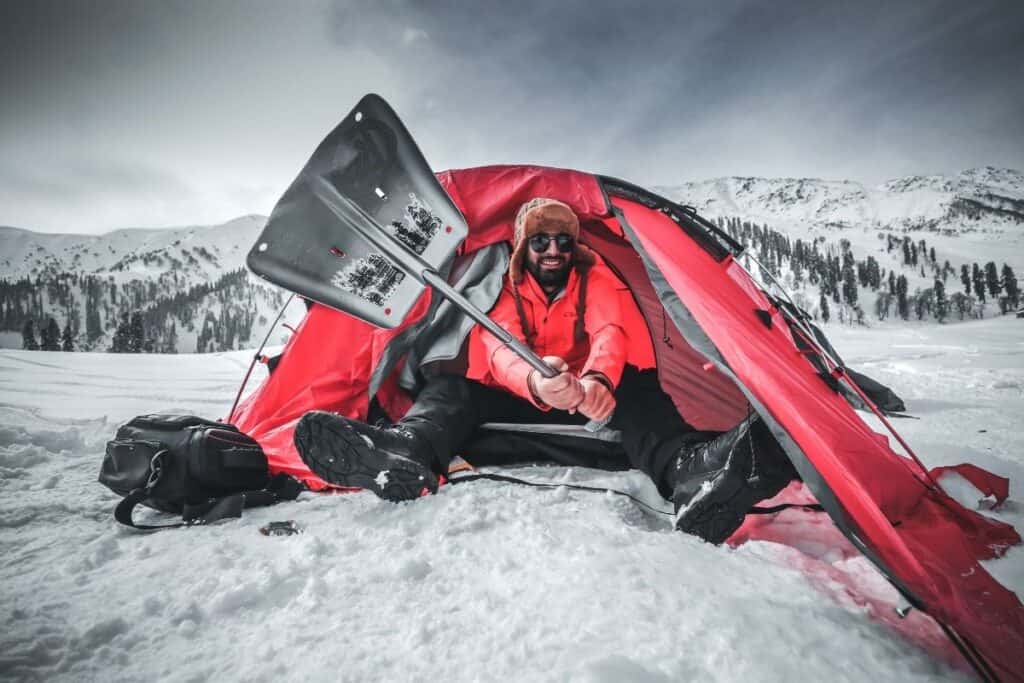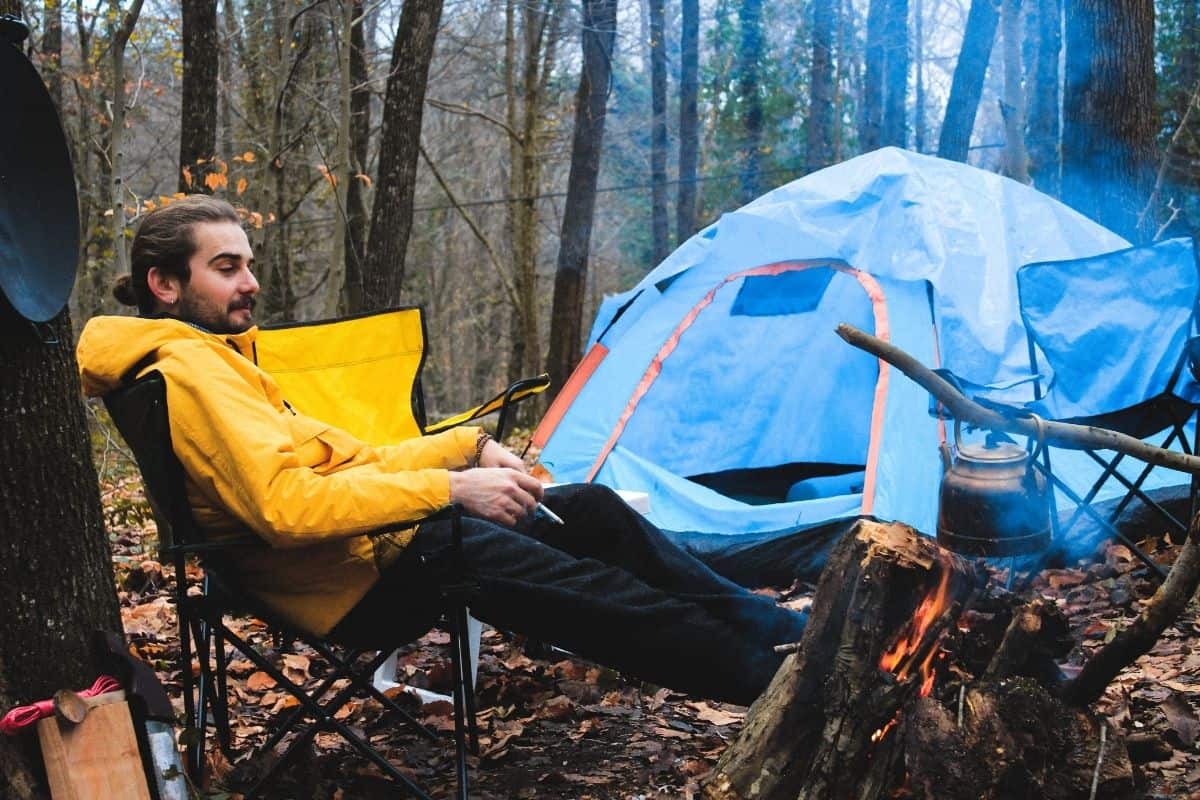
So you’ve planned that camping trip you and your buddies have always wanted to go on, but now the weather isn’t exactly co-operating. Can you still camp if it’s getting a little chilly out there, and will your tent help keep you warm?
Tents trap heat from your body and help protect you from wind, rain, and other outdoor elements, therefore making it warmer than having no shelter at all. The tent’s seasonal rating, your sleeping bag, and sleeping pad thermal rating will further impact how warm you stay in the tent.
No one wants to wake up after a long sleep in a freezing tent! There are a few factors that affect how warm your tent is. Here’s what you should keep in mind if you’re wondering are tents warm!
Factors Affecting Tent Warmth
How warm your tent becomes depends on the preparation you take before you set out on a trip. Here are some factors that could cool your tent down if you’re not careful.
Four-season or Three-season Tent
One of the most important factors going into how warm your tent gets is the tent itself. The type of fabric used for insulation depends on the sort of tent you purchased.
Three-season tents are for average weather conditions. We call these backpackers’ tents because they’re cheap, light, and easy to travel with. They can withstand light rain, wind, and slight dips in warmth.
Four-season tents are for those who know they’ll experience cold weather or other extreme conditions. Four-season tents can take anything Mother Nature can throw at them, including high winds, snow, and extreme cold.
Four-season tents are better for cold conditions because they have an extra layer of material that acts as insulation. The extra insulation, although small, has a large effect on warmth in the tent.
Tent Size
One of the ways tents heat up is because of body heat. If you and your partner are the only ones in a tent designed for six people, the tent will have a harder time warming up!
The tent doesn’t heat up as fast due to the amount of air in the tent. If you have a large tent with just a couple of people, there’s too much cool air in the tent for your group to heat up. Although the tent will still be warmer than outside, you may not notice until you step outside.
Brrr!
When you choose the right size tent for your group, you’ll see how much faster the tent heats up! Although body heat doesn’t seem like a huge source of warmth, a small tent can warm up quickly with just a couple of people.
Tent Location
When you’re looking for an area to pitch the tent for the night, you want to avoid some areas. Although tents should be windproof, there are always a few ways for air to leak in and out. For that reason, you want to avoid windy places at all costs.
You should also avoid large bodies of water. Everyone knows it’s beautiful to camp alongside the shores of a lake, but they can also negatively impact the warmth in your tent. During the spring thaw, lakes are often colder than their surrounding areas, not to mention how windy they get.
It would help if you also avoided the bottom of a valley. Valleys, during colder weather, are where cold air settles. If you choose to pitch your tent in a valley, you risk camping in an area that’s colder than everywhere else.
Ventilation
It may seem a little counterproductive to worry about ventilation when you want to keep your tent warm, but trust us, it’s crucial. If your tent doesn’t have proper ventilation, condensation will build up in your tent.
Condensation occurs in your tent because your breathing has created humidity and warmed up the tent’s air, which then comes into contact with the tent fabric. The other side of the material is cold, so water builds up on the warm side.
Throughout an evening, condensation can build up, either raining on you while you sleep or coating your tent in water. Either can reduce the amount of heat remaining in your tent.
To combat condensation, you want a tent that has proper ventilation. Four-season tents, due to their dual-layers, often have ventilation built-in. If your tent doesn’t, you can leave a door partially unzipped to allow for air flow.
Just pray that there aren’t a lot mosquitos nearby in this case!
Morning Frost
After you wake up and get out of your tent, you may notice a thin white layer of frost covering your tent. On frigid nights, this isn’t uncommon.
The frost on your tent can affect the warmth inside, though. As soon as you wake up, it would be best if you cleared off the ice.
Not only is it a cold substance clinging to your tent, but when it melts, it will also soak your tent. That could cause an even colder tent.

How to Keep Your Tent Warmer!
Now that you know what factors are at play, here are some tips to keep your tent warm.
Insulate Your Tent
Although a four-season tent has more insulation than a three-season, that doesn’t mean it’s fully insulated yet. The most important area of the tent to protect is the ground.
The groundsheet of your tent stays in contact with the ground, making it cool. If you don’t put another layer on your groundsheet, you’ll wake up to/on the cold ground each morning.
Adding a rug or carpet to the ground is an excellent way to insulate your tent. Since you’re adding another layer that the cold has to penetrate to get into the tent, you’ll keep it much warmer.
Sleeping Bags
Tents should protect you from the elements and provide you with some warmth, but the primary way you stay warm in a tent is with a sleeping bag. Choosing the right sleeping bag helps keep you warm more than anything else.
Sleeping bags are usually temperature rated, which makes choosing the right one easy. Either synthetic or goose-down insulation can protect you from the cold.
Other features, like the bag’s shape, affect how well they keep you warm. Mummy sleeping bags restrict your movement because they zip up, but they also retain heat the best. Sometimes sleeping bags have hoods, which also help keep you warm.
Sleeping Pads
By elevating yourself off the ground, you can stay warmer in your tent. Even if you’ve put down a tent rug, the ground can still be a little cold—not to mention uncomfortable!
A sleeping pad can keep you comfortable and warm in your tent. You can use inflatable pads that keep you roughly one inch off the ground. That’s all it takes to feel the effects since keeping you off the cold ground helps you retain body heat.
Heaters
Using a heater during a camping trip seems like an obvious solution to warmth issues. Although it will heat your tent, we only recommend these as a last resort due to problems arising from their use.
Gas heaters should not be used in enclosed spaces since the exhaust fumes can poison you. If you need a heater, make sure to buy one designed for tents. These sorts of heaters are electric and hook up to a battery or gas generator.
Never leave a heater on in a tent unattended or while you’re asleep. Also, don’t leave the heater on too long, even if you’re watching it. Heaters can quickly burn a hole through the tent fabric.
If you’re planning on using a tent heater, use it with caution.
So, Are Tents Warm?
Tents are as warm as you make them! Make yours warmer by keeping in mind the factors that make a tent cold, like fabric, size, and location.
As long as you put in the prep, your tent will feel so warm you may never want to leave it!
Related Posts
If you found this article helpful, then make sure to take a look at some of my related articles below!
